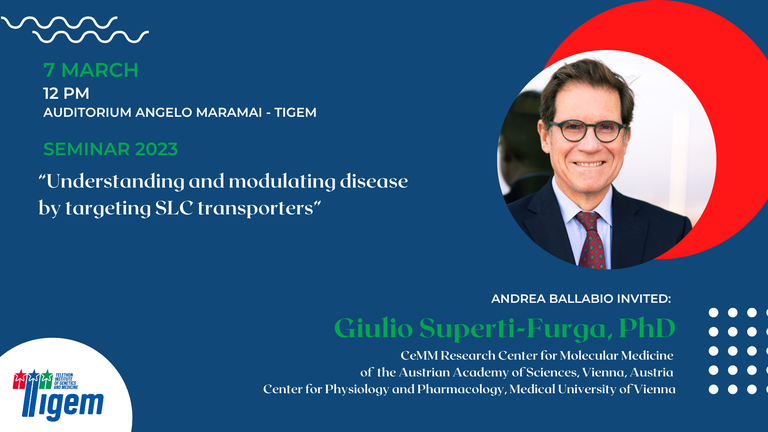Giulio Superti-Furga, PhD - "Understanding and modulating disease by targeting SLC transporters"
- When Mar 07, 2023 from 12:00 PM to 01:15 PM (Europe/Berlin / UTC100)
- Where Tigem Auditorium Angelo Maramai
- Contact Name Andrea Ballabio
- Contact Phone 08119230659
-
Add event to calendar
iCal

- https://www.tigem.it/newsroom/seminars/giulio-superti-furga-phd-understanding-and-modulating-disease-by-targeting-slc-transporters
- Giulio Superti-Furga, PhD - "Understanding and modulating disease by targeting SLC transporters"
- 2023-03-07T12:00:00+01:00
- 2023-03-07T13:15:00+01:00
Giulio Superti-Furga, PhD (Short CV)
CeMM Research Center for Molecular Medicine of the
Austrian Academy of Sciences, Vienna, Austria
Center for Physiology and Pharmacology,
Medical University of Vienna, Vienna, Austria
Abstract
Management of chemical exchange across cellular membranes is critical to ensure the access to nutrients, the riddance of waste, and to safeguarding integrity of a biological system such as an organelle, cell, organ, or organism. Dedicated proteins are involved in the import of most chemical matter and expressed only when and where required, for energetic reasons, chemical safety, and cellular homeostasis. The expression of particular membrane transporters integrates the metabolic requirements of the systems with environmental availability. Regulation of the expression and function of solute carrier proteins (SLCs), the largest group of transporters in the human genome, can therefore control cell metabolism and processes depending on it. We have started to systematically chart SLC function by genetics, proteomics and chemical biology and we find that SLCs modulate a large variety of cellular processes: such as metabolism, signalling, chromatin states, specific immune cell functions. In this talk I will highlight several examples of our research such as the utilization of the synthetic lethality between the lactate transporters SLC16A1 and SLC16A3 which we developed into a chemical screen, starting with a 90.000 compounds-strong library which allowed the identification of selective SLC16A3 inhibitors. In another project we used a phenotypic assay which allowed us to follow the degradation of the immune adaptor TASL, the TLR adaptor interacting with SLC15A4 on the lysosome, and we identified an inhibitor able to disrupt the SLC15A4-TASL adaptor module – a module that we identified previously, and which affects TLR7, 8 and TLR9-induced inflammatory responses and plays a role in disease development in systemic lupus erythematosus (SLE). And, if time allows, I want to briefly show a recent study where we did a genome-wide CRISPRko FACS screen which has generated a comprehensive genetic map of phagocytosis regulators. We mapped the hits to a comprehensive protein-protein interaction network which was annotated for functional cellular processes. Among the complexes known to play a role in phagocytosis we identified novel functions such as the oligosaccharyltransferase complex MAGT1/SLC58A1. Altogether, these studies herald an age in which the interface between chemistry and biology can be studied, understood and modulated with unprecedented precision.
